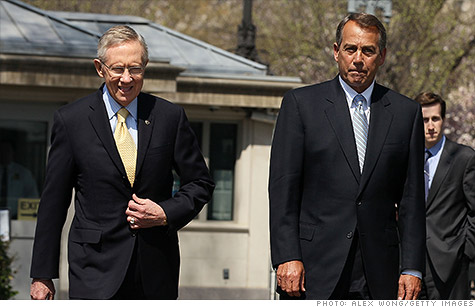Search News

Senate Majority Leader Harry Reid and House Speaker John Boehner reached a deal to avert the risk of a government shutdown. But Congress won't vote on that deal until this fall.
NEW YORK (CNNMoney) -- The Federal Reserve has made clear it's standing down for now on more steps to aid the economy.
So the job is back to Congress.
The U.S. economy, of course, faces a lot of risks. But one of the biggest is Congress itself.
And it's a risk that Federal Reserve Chairman Ben Bernanke has said repeatedly he can't counteract if lawmakers fail to agree on how to lessen the impact of the fiscal cliff.
That cliff is made up of $7 trillion worth of tax increases and spending cuts set to start taking effect 5 months from now.
Economists have warned that letting those policies take effect in full could push the economy into a recession next year.
"[I]f no action were to be taken, the size of the fiscal cliff is such that there's I think absolutely no chance that the Federal Reserve ... could or would have any ability whatsoever to offset ... that effect on the economy," Bernanke said a few months ago.
This month he was equally blunt, noting it is not the Fed's role to crack the whip on lawmakers to act fiscally responsible. "Congress is in charge here," he said.
So is Congress taking charge? Lawmakers are trying to show that they're taking charge.
Leaders from both parties have made much of two bipartisan deals reached this week that must still be approved by both chambers of Congress.
The first is an agreement to fund the government for the first six months of fiscal year 2013, which starts in October.
"This agreement reached between the Senate, the House and the White House provides stability for the coming months," said Senate Majority Leader Harry Reid on Tuesday.
Except that it really won't.
Sure, it would prevent the threat of a government shutdown. But it does nothing to address any of the measures of the fiscal cliff, except to establish the funding level from which the so-called sequester of spending cuts must be made. Other than that, "this deal doesn't affect the sequester whatsoever," said budget expert Stan Collender.
The measure won't be voted on until lawmakers return from summer recess in September.
Then there's the bipartisan deal cut Wednesday by the top Democrat and Republican on the Senate's tax-writing committee. That deal will extend for a year many smaller tax breaks that are set to expire or already have, and it eliminates 25% of the "usual" tax extenders.
"This win shows we're able to come together to tackle tough problems," said Sen. Max Baucus, the committee chairman.
Ranking member Orrin Hatch described it as a "first step towards ... tax reform that shows that there is a path to resolving the challenges we face as a nation."
But as tough problems and first steps go, it's not that hard or that big a leap to agree on extending many popular tax breaks and add the cost -- an estimated $205 billion -- to deficits.
In the meantime, the House this week had a predictable partisan debate over how to extend the Bush tax cuts -- a major part of the fiscal cliff. The Republican-preferred version passed.
But it will go nowhere in the Senate, which went through the same exercise last week. The Senate passed the Democratic-preferred version, which will go nowhere in the House.
Then there's the specter of the nearly $1 trillion in spending cuts -- half in defense and half in non-defense -- that neither party likes but which Congress has yet to seriously focus on replacing.
The House Armed Services Committee on Wednesday held a hearing to discuss how the Obama administration will direct federal agencies to plan for the cuts.
Some of the hearing stayed on point, but the rest devolved into a blame game.
First there was back-and-forth on who is to blame for the sequester in the first place. Then it switched to which party is to blame for holding up a Bush tax cut extension. And then finally conversation turned to who was to blame for turning the hearing on a very bipartisan issue into a partisan food fight.
It was, in short, a microcosm of the endless back-and-forth that's been going on for more than a year in Congress. ![]()
| Overnight Avg Rate | Latest | Change | Last Week |
|---|---|---|---|
| 30 yr fixed | 3.80% | 3.88% | |
| 15 yr fixed | 3.20% | 3.23% | |
| 5/1 ARM | 3.84% | 3.88% | |
| 30 yr refi | 3.82% | 3.93% | |
| 15 yr refi | 3.20% | 3.23% |
Today's featured rates:
| Latest Report | Next Update |
|---|---|
| Home prices | Aug 28 |
| Consumer confidence | Aug 28 |
| GDP | Aug 29 |
| Manufacturing (ISM) | Sept 4 |
| Jobs | Sept 7 |
| Inflation (CPI) | Sept 14 |
| Retail sales | Sept 14 |